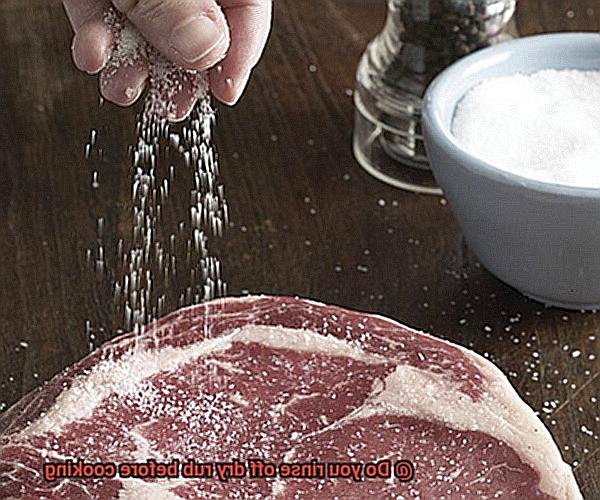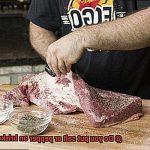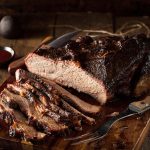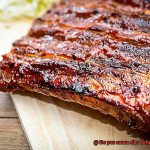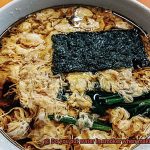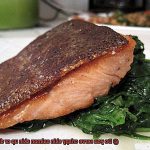Have you ever had high hopes for a juicy, flavorful meal, only to be left with a dry and lackluster result? If you’re nodding your head in agreement, then you know the struggle of finding the perfect seasoning for your meat. Enter the dry rub – a powerful combination of herbs, spices, and maybe even some sugar that can transform any ordinary cut of meat into a mouthwatering masterpiece. But here’s the million-dollar question: should you rinse off your dry rub before cooking?
Some cooks swear by rinsing off their dry rubs before cooking, while others argue that doing so removes essential seasonings. So what’s the verdict? Well, it depends on several factors such as the type of meat and recipe being used.
In this blog post, we’ll dive deep into using dry rubs and provide tips on how to achieve maximum flavor without sacrificing tenderness. We’ll explore both sides of the debate on whether or not to rinse off dry rubs and introduce alternative seasoning methods that will take your cooking skills to new heights.
Whether you’re an experienced grill master or just starting out in the kitchen, get ready to learn everything there is to know about using dry rubs. So sit back, relax, and let’s find out if rinsing off your dry rub is really necessary for creating a delicious meal.
Contents
What is Dry Rub?
A dry rub is a blend of spices, herbs, and seasonings that is applied directly to the surface of meat, poultry, or seafood before cooking. This creates a flavorful crust on the outside while keeping the meat juicy and tender on the inside.
One of the great things about dry rubs is their versatility. They can be made with a variety of ingredients, including paprika, chili powder, cumin, garlic powder, onion powder, salt, pepper, and even brown sugar. The combination of ingredients can be altered depending on the type of meat being cooked and the desired flavor profile.
Using a dry rub is simple yet crucial for achieving optimal flavor. Apply the rub evenly and thoroughly to all sides of the meat and let it rest before cooking. This allows the flavors to penetrate into the meat and creates an explosion of taste with every bite.
Dry rubs are not only easy to use but also convenient. They don’t require as much time or effort as wet marinades and can be made in advance. Plus, they’re versatile enough to be used in various cooking methods such as barbecue, grilling, oven roasting or pan-searing.
To avoid washing away those delicious spices and herbs, it’s important not to rinse off the dry rub before cooking. Instead, let it work its magic by allowing the meat to absorb all those flavorful ingredients.
Should You Rinse Off Dry Rub Before Cooking?
Then you must have come across dry rubs – a blend of herbs and spices that can transform any meat into a flavor bomb. But, like many other things in the grilling world, there is some debate about whether or not to rinse off the dry rub before cooking. So, should you rinse off dry rub before cooking? Let’s dive into the reasons why some grillers prefer rinsing off the dry rub before cooking versus leaving it on.
One of the primary reasons given for rinsing off the dry rub is to prevent burning. Dry rubs often contain sugar and other ingredients that can caramelize and burn when exposed to high heat. Rinsing off the rub before cooking can remove any excess sugar or spices that might burn and leave an unpleasant taste. Additionally, removing the dry rub can help ensure that the meat cooks evenly, without any burned or undercooked spots.
However, some grillers prefer leaving the dry rub on the meat to add flavor and texture. The spices and seasonings in the rub can infuse into the meat as it cooks, creating a delicious crust and enhancing the overall flavor profile. Additionally, leaving the rub on can help seal in moisture and create a delicious bark on the surface of the meat.
If you’re still unsure whether to rinse off your dry rub before cooking, consider these sub-topics:
- The type of meat: Different meats require different approaches when it comes to using a dry rub. For example, some meats like chicken may benefit from rinsing off the dry rub before cooking, while others like pork ribs may benefit from leaving it on.
- The cooking method: The cooking method you choose can also impact whether or not to rinse off your dry rub. For instance, if you’re grilling at high heat, rinsing off the dry rub might be necessary to avoid burning. But if you’re cooking low and slow, leaving the rub on can help enhance the flavor.
Ultimately, whether or not to rinse off dry rub before cooking comes down to personal preference. If you are concerned about burning or uneven cooking, rinsing off the rub may be a good option. However, if you want to maximize flavor and texture, leaving the rub on can be a great way to enhance your grilling experience.
Benefits of Not Rinsing the Dry Rub
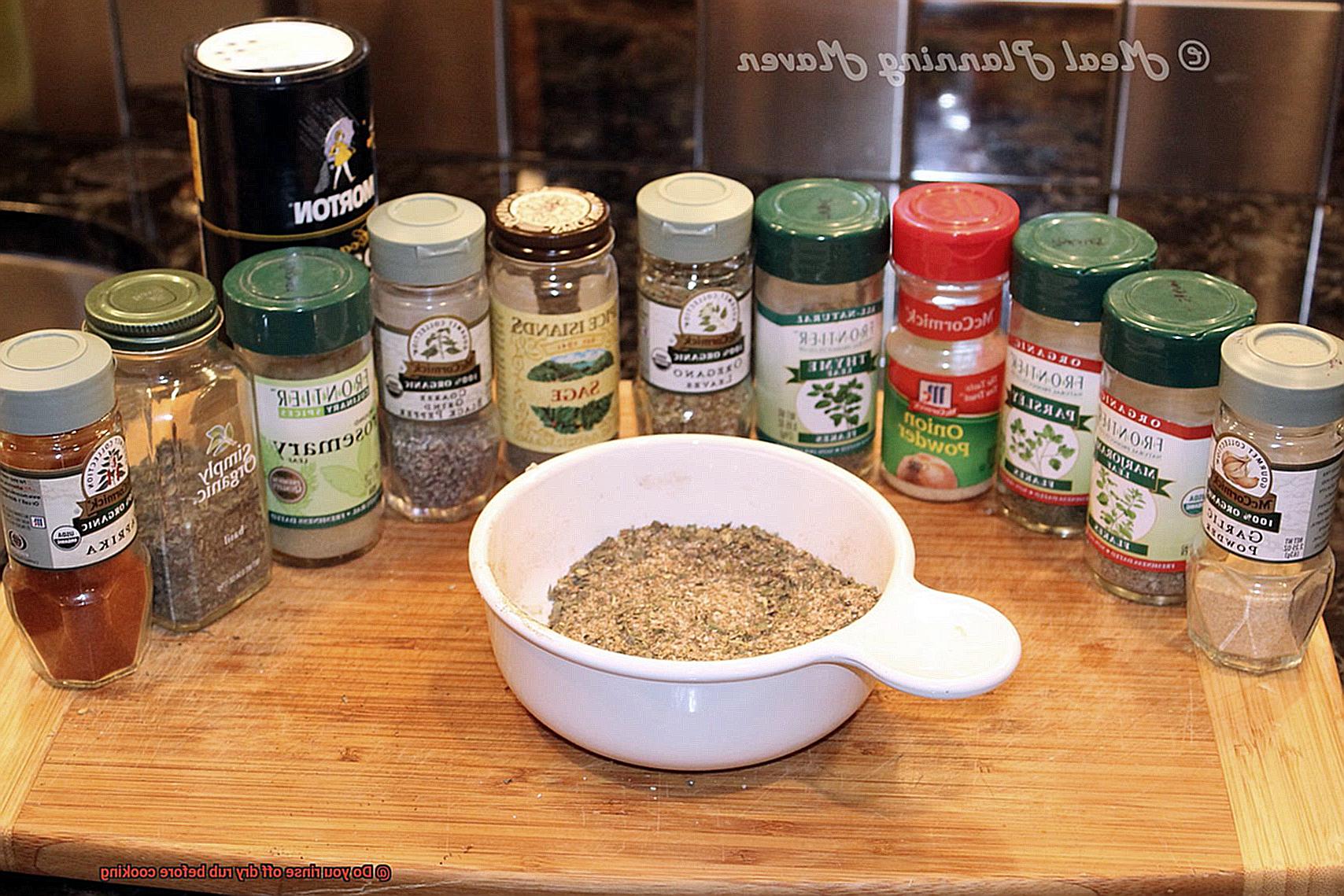
Well, good news – there are actually several benefits to leaving it on. As an expert in this area, I’ve delved into the research and found three compelling reasons why you should leave that rub right where it is.
Firstly, leaving the dry rub on your meat can create a mouth-watering crust. As the meat cooks, the rub will caramelize and form a delicious crust that adds texture and flavor to every bite. Who doesn’t love a juicy, tender meat with a flavorful crust that packs a punch of flavor?
Secondly, leaving the dry rub on can help to tenderize the meat. The salt in the rub draws out moisture from the meat, which then gets reabsorbed back into the meat along with the flavors of the rub. This process can break down tough muscle fibers and make the meat more tender and juicy. The result? A melt-in-your-mouth experience that your taste buds will thank you for.
Lastly, not rinsing off your dry rub can save you time and effort while still delivering amazing results. Why bother with extra steps and mess when you can simply apply the rub and start cooking? It’s a win-win situation.
Here are some bonus benefits of not rinsing off your dry rub:
- It helps to lock in moisture: By keeping the dry rub on the meat, it acts as a barrier that helps to keep moisture within the meat. This means your meat will be less likely to dry out during cooking.
- It adds complexity to the flavor: By leaving the dry rub on, you allow all those spices and herbs to meld together and create complex flavor profiles that will tantalize your taste buds.
- It enhances appearance: Let’s face it – food that looks good tastes better. Leaving the dry rub on your meat creates a beautiful, golden-brown crust that looks just as delicious as it tastes.
Potential Contamination Risk When Rinsing the Dry Rub
However, it’s important to consider the potential risks of doing so to ensure food safety. Rinsing the meat can actually spread harmful bacteria from the surface of the meat to other surfaces in your kitchen, including countertops, cutting boards, and utensils. This happens because when the water hits the meat, it can splash and spread any bacteria that may be present.
Moreover, using the same container or utensils for both the dry rub and rinsing off the meat can introduce any bacteria from the dry rub into the rinse water and onto the surface of the meat, leading to cross-contamination. This can be detrimental to your health if not addressed properly.
It’s essential to note that rinsing off dry rub before cooking can also wash away some of the flavorful seasoning. This can lead to a less flavorful final product, leaving you disappointed with your meal.
To minimize these risks, always use clean utensils and containers for rinsing off the meat. Additionally, immediately clean any surfaces or utensils that come into contact with raw meat to prevent cross-contamination. Lastly, cook your meat thoroughly to kill any potential bacteria present.
How to Apply a Dry Rub Correctly
Grilling is one of the most popular ways to cook meat, but if you’re looking for an easy way to add some extra flavor to your dishes, try using a dry rub. A dry rub is a blend of herbs and spices that are rubbed into the surface of the meat before cooking. Here are some top tips on how to apply a dry rub correctly for grilling:
Tip 1: Choose the Right Rub
Choosing the right dry rub is crucial to getting the best flavor. Think about the type of meat you’ll be grilling and what flavors will complement it. For example, a spicy rub might work well with beef, while a sweeter rub could be better suited for pork.
Tip 2: Prepare the Meat
Make sure your meat is clean and dry before applying the dry rub. Use paper towels to pat it dry and remove any excess fat or skin. This will help the rub stick to the meat and ensure even cooking.
Tip 3: Apply Generously
Don’t be stingy with your dry rub. Use enough to generously coat the meat, making sure to massage it into all sides, including any crevices or folds. This will help the flavors penetrate deeply into the meat.
Tip 4: Let It Rest
After applying the dry rub, let the meat rest for at least 30 minutes (ideally longer) before grilling. This gives the flavors time to infuse into the meat and helps it cook more evenly.
Tip 5: Don’t Rinse Off
Contrary to popular belief, you should not rinse off your dry rub before grilling. Doing so will wash away all those flavorful spices you just added. Instead, let it sit on the meat and work its magic.
Tips for Using Dry Rubs
When it comes to grilling, using a dry rub can take your meat to the next level. But just like any cooking technique, there are tips and tricks to make sure you’re using dry rubs effectively. Here are five tips for using dry rubs like a pro:
Be Generous
Don’t be stingy when it comes to applying your dry rub. Make sure every inch of your meat is covered in the flavorful mixture. This will ensure that every bite is packed with taste.
Use Fresh Spices
The quality of your spices can make or break your dry rub. Using fresh, high-quality spices will give you the best results. If you’re not sure if your spices are still good, give them a sniff
Let It Sit
Patience is key when it comes to using a dry rub. After applying the rub, let your meat sit for at least 30 minutes before grilling. This allows the flavors to seep into the meat and gives you a more complex taste.
Adjust for Heat
If you’re using a spicy dry rub, start with a smaller amount than you think you need and work your way up as you taste it. Remember that everyone has different spice tolerances, so don’t assume that what’s spicy for you is spicy for everyone.
Don’t Rinse
Once you’ve applied your dry rub, resist the urge to rinse it off before cooking. This would wash away the flavors you worked so hard to infuse into your meat. Instead, trust that the dry rub will create a delicious crust on your meat.
The Importance of Letting the Meat Rest After Applying a Dry Rub
You may be wondering if you should rinse off the rub before cooking. But before we answer that question, let’s explore the importance of letting your meat rest after applying a dry rub.
Resting your meat after applying a dry rub is not just a recommendation; it’s a crucial step in achieving the best possible flavor and texture. When you apply a dry rub to your meat, it can cause the surface to become dehydrated, leading to tough and dry meat if not rested properly.
However, letting your meat rest after applying a dry rub can work wonders for its overall taste and tenderness. By resting the meat, you’re allowing the flavors of the rub to fully penetrate the meat, bringing out its natural deliciousness. Furthermore, allowing the meat to rest also ensures that it retains its moisture and tenderness during the cooking process.
The amount of time needed for resting varies depending on the thickness of your cut of meat. It’s recommended to rest for ten minutes per inch of thickness. During this time, it’s best to cover the meat with foil or a lid to retain heat and moisture.
But that’s not all – letting your meat rest after applying a dry rub can also make it easier to slice and serve. By giving your meat some time to settle and stabilize, it’s less likely to fall apart or lose shape when cut, allowing for perfect presentation on your plate.
6h-Wb4pKmn0″ >
Conclusion
In conclusion, dry rubs are a fantastic way to elevate the flavor and texture of your meat. The ongoing debate about whether or not to rinse off the rub before cooking has been a hot topic for many grillers. However, it ultimately boils down to personal preference and the type of meat and cooking method being used.
Some grillers prefer rinsing off the rub to prevent burning and ensure even cooking. On the other hand, others argue that leaving it on can create a mouth-watering crust, tenderize the meat, and enhance its appearance. Whichever camp you belong to, make sure you choose a high-quality blend of spices that complements your meat perfectly.
When applying your dry rub, be generous with it. Let it rest for at least 30 minutes before grilling to allow the flavors to infuse into your meat fully. And most importantly, never rinse off your dry rub before cooking as it washes away all those flavorful spices you just added.
Remember that letting your meat rest after applying a dry rub is crucial in achieving optimal tenderness and flavor. Resting allows flavors to penetrate deeper into the meat while retaining moisture during cooking.

